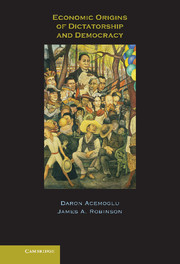Crossref Citations
This Book has been
cited by the following publications. This list is generated based on data provided by Crossref.
Gallego, Domingo
1970.
Entre el autogobierno y el Estado. Las instituciones y el desarrollo económico.
Iberian Journal of the History of Economic Thought,
Vol. 3,
Issue. 2,
p.
144.
Iversen, Torben
2005.
Capitalism, Democracy, and Welfare.
Lagunoff, Roger
2005.
Dynamic Stability and Reform of Political Institutions.
SSRN Electronic Journal,
Merlo, Antonio M.
2005.
Whither Political Economy? Theories, Facts and Issues.
SSRN Electronic Journal,
Dal Bo, Ernesto
Dal Bo, Pedro
and
Snyder, Jason
2006.
Political Dynasties.
SSRN Electronic Journal,
2006.
Debate.
Europe-Asia Studies,
Vol. 58,
Issue. 7,
p.
1141.
ACEMOGLU, DARON
and
ROBINSON, JAMES A.
2006.
Economic Backwardness in Political Perspective.
American Political Science Review,
Vol. 100,
Issue. 1,
p.
115.
Bourguignon, Francois
Ferreira, Francisco H. G.
and
Walton, Michael
2006.
Equity, Efficient and Inequality Traps: A Research Agenda.
SSRN Electronic Journal,
Segura-Cayuela, Ruben
2006.
Inefficient Policies, Inefficient Institutions and Trade.
SSRN Electronic Journal,
Eichengreen, Barry
and
Leblang, David A.
2006.
Democracy and Globalisation.
SSRN Electronic Journal,
Huang, Fali
2006.
The Coevolution of Economic and Political Development.
SSRN Electronic Journal,
Ross, Michael
2006.
Is Democracy Good for the Poor?.
American Journal of Political Science,
Vol. 50,
Issue. 4,
p.
860.
HENISZ, WITOLD J.
and
MANSFIELD, EDWARD D.
2006.
Votes and Vetoes: The Political Determinants of Commercial Openness.
International Studies Quarterly,
Vol. 50,
Issue. 1,
p.
189.
Persson, Torsten
and
Tabellini, Guido
2006.
Democratic Capital: The Nexus of Political and Economic Change.
SSRN Electronic Journal,
Spilimbergo, Antonio
2006.
Democracy and Foreign Education.
SSRN Electronic Journal,
IVERSEN, TORBEN
and
SOSKICE, DAVID
2006.
Electoral Institutions and the Politics of Coalitions: Why Some Democracies Redistribute More Than Others.
American Political Science Review,
Vol. 100,
Issue. 2,
p.
165.
Blomberg, S. Brock
and
Broz, J. Lawrence
2007.
The Political Economy of IMF Voting Power and Quotas.
SSRN Electronic Journal,
Boas, Taylor C.
2007.
Conceptualizing Continuity and Change.
Journal of Theoretical Politics,
Vol. 19,
Issue. 1,
p.
33.
Desai, Raj M.
Yousef, Tarik
and
Olofsgård, Anders
2007.
The Logic of Authoritarian Bargains: A Test of a Structural Model.
SSRN Electronic Journal,
Campante, Filipe R.
2007.
Redistribution in a Model of Voting and Campaign Contributions.
SSRN Electronic Journal,



